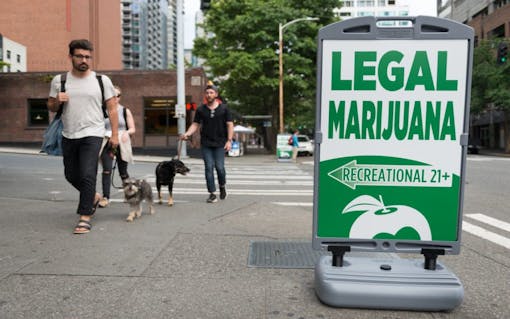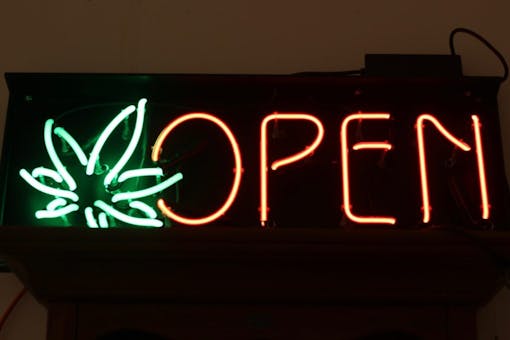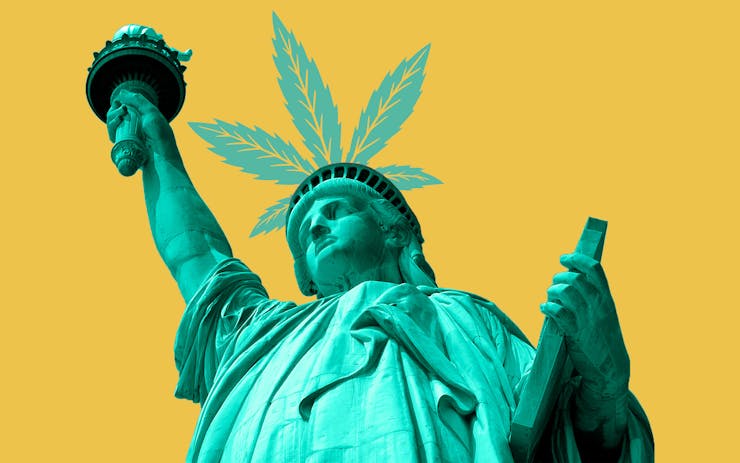New York’s first cannabis retailers are slated to open this month. But many licenses are in limbo in a federal court case. Here’s what the plaintiff told Leafly, plus reactions from dispensary applicants and lawyers impacted by the decision.
Many of New York’s first 175 weed stores were supposed to open doors this month, then on a rolling basis into early 2023. But in November, a federal judge barred the state from granting 63 of its allotted licenses until a civil case is resolved. As a result, dozens of adult-use dispensaries won’t open in Brooklyn, Central New York, Finger Lakes, Mid-Hudson, and Western New York, until a lawsuit filed by a disgruntled applicant is resolved in court.
Leafly has previously reported on the details of the case, and its plaintiff—a newly-registered New York corporation called Variscite, which is owned by a Michigan man. The same man filed similar suits in Los Angeles and Sacramento, but federal judges in both states refused to grant similar injunctions to halt those social equity programs.
The plaintiff claims New York’s state dispensary license application discriminates against out-of-state operators and blocks interstate commerce, a direct violation of the Dormant Commerce Clause. The clause forbids states from favoring their own economies over a healthy national marketplace.
The Sacramento judge abstained from ruling, citing the ambiguity between federal and state cannabis laws. That case is now headed to appeals court. New York regulators said they plan to appeal the temporary injunction that’s currently blocking their weed store rollout.
Here’s what the plaintiff told Leafly, plus reactions to the case from New Yorkers whose businesses are impacted by the lawsuit.
Plaintiff in New York dispensary case gives public comment

According to the court, the plaintiff Variscite meets some of the criteria for Conditional Adult-use Recreational Dispensary (CAURD) applicants. One requirement Variscite checks off is the majority owner’s non-violent cannabis conviction. The problem is the conviction was in Michigan, not New York. So the owner, a Michigan man named Kenneth Gay, is ultimately disqualified from the first round of CAURD licenses.
When first asked about the timeline and intentions of the lawsuit, Variscite’s lawyer, Christian Kernkamp, told Leafly via email November 15, “Plaintiff is not making a statement at this time but we will be sure to include you if Plaintiff makes a statement in the future.”
On November 22, Kernkamp shared this statement from the plaintiff via email:
“The plaintiff, Variscite, had hoped to avoid enjoining cannabis sales in New York. Variscite made an offer to settle this case at no cost to the State so licensing could proceed, but the State never even gave us the courtesy of a response. The injunction could be over tomorrow, but the State prefers instead to litigate even though the court has already found a ‘clear likelihood’ that the State violated Variscite’s constitutional rights.”
Christian Kernkamp, representing Variscite NY One
What did the state of New York say about the case?

The OCM declined to comment on open litigation, but expressed confidence that this case will not significantly delay the adult-use market’s late-2022-to-early-2023 timeline.
Shop highly rated dispensaries near you
Showing you dispensaries nearIn November, a CAURD applicant in one of the impacted regions sent Leafly a copy of the email they received from the OCM with updates on how the case would impact their application. The email read: “Due to a recent court ruling… the New York State Cannabis Control Board (Board) is… unable to issue licenses in these regions, until the judicial proceeding is resolved, or the plaintiff has withdrawn their complaint.”
“The Office will continue deficiency review and will be communicating with applicants to resolve deficiencies in their applications. The Office will continue to communicate with applicants as updates become available.”
New York Office of Cannabis Management email to CAURD applicants addressing lawsuit
Delayed applicants are patient, but some are pivoting

Alex Norman is building out a consumption lounge and dispensary brand called Budega NYC. Norman qualified for all of the state’s CAURD applicant requirements, including having a New York state cannabis charge. Norman told Leafly his lawyer brought the possibility of a case like this to his attention over the summer.
“It sounds so obscure that you’re like, ‘Dormant Commerce Clause? Whatever that means.’ It doesn’t even sound like it’s a real thing,” Norman said. When he looked into the case and realized the plaintiff lived in Michigan, and didn’t have a cannabis conviction in New York. “I did some digging and realized the person is just hating on the situation,” Norman said.
“I started my brand three years ago in anticipation of an opportunity like this,” Norman told Leafly. “But I’m not gonna say it’s gonna stop me. I have the brand positioned in a way that allows me to pivot.” If things don’t work out in court, Norman said he’ll just work with a processor to start licensing the Budega NYC brand into other stores. The brand is also positioned to be a high-end consumption lounge when the law allows for those to go into business.
‘You’re getting in the way of guys like myself’

Norman thinks the plaintiff could be acting on behalf of a large weed company that is frustrated New York won’t let them set up shop as easily as other states. Or, Norman said, “It’s just somebody acting like a baby about it.” Whatever the motivation, he worries it could inspire copycats and opportunists in New York and other states.
“What’s the motive really? You’re getting in the way of guys like myself that got arrested and were targeted, or at least were affected by the most aggressive policing of cannabis anywhere in the world. New York has the highest number of weed arrests than any other city, any country in the world. So it was really something very selfish and more reactionary. Like a kid, (instead of) really trying to take a step back and looking at it. It’s a selfish move.”
Alex Norman, CAURD applicant in Brooklyn whose license application is on hold indefinitely
Norman said his lawyer advised it could take 3 months or more for the court to give New York permission to grant the held licenses. That’s why, he said, “I’ve already kind of shifted to plan B and I just have to wait and see how things pan out. I can’t sit here and f***ing mope about it and complain and be negative.”
What do cannabis law experts say about this case?

“I think it could upend the CAURD program all together,” said Neil Willner, co-chair of the Cannabis Group at Royer Cooper Cohen Braunfeld LLC. “It would really be a shame if that process and those applications got tossed because of this case,” Willner told Leafly via phone in early November after the temporary injunction was first granted.
Willner has worked for the past five years with marijuana and hemp companies focused on regulatory compliance. “I’ve been living and breathing with all the ups and downs of the adult use program, and it’s been a roller coaster.” Willner said the high stakes of the case lead him to believe the state will settle with the plaintiff to avoid further delays. A settlement could include a payment, or a special license.
“It was in my mind a calculated strategy,” Willner told Leafly. He believes the plaintiff applied for a New York license knowing that it would be rejected.
“It had to have been (calculated),” Willner said since, “Variscite did not have a significant presence in New York, which is a requirement.” Willner thinks no one would have paid the time or money to apply knowing they were ineligible, “Unless they were ready to litigate.”
How similar cases have played out in other states
While the plaintiff has failed to impact California’s license programs, but Willner said that Missouri and Maine are “some of the federal courts across the country that have ruled that the Dormant Commerce Clause does apply to the cannabis business.”
Despite the precedence, Willner challenges, “Why does the government have the authority to regulate something they deem illegal? There shouldn’t be an interstate market for this in the first place.”
The judges ruling over the Los Angeles and Sacramento Variscite cases seems to agree with Willner. Last week, an LA judge refused to grant a similar injunction that would have halted the city’s new social equity program, and the Sacramento judge abstained from judgement altogether.
Why did a NY federal judge block state dispensary licenses?

Attorney Dan McKilliop counsels corporate, commercial, and private clients for Scarinci Hollenbeck in the New York Metro area. McKilliop told Leafly that New York can win the lawsuit if they show a legitimate purpose for requiring licensees to have cannabis convictions within the state in upcoming proceedings.
But Mckilliop said that so far, “The Attorney General representing the state and its cannabis office hasn’t fully addressed the Dormant Commerce Clause, or provided any legit purpose or reason for having rules that favor New York actors.”
“I think that was a misstep,” McKilliop said, since there is clear data on New York’s disproportionate enforcement against marijuana in the past, and clear need to repair the communities most impacted.
“This case is frustrating to see. Especially in light of the noble cause for the policy behind the CAURD program. It’s certainly a progressive policy. But despite how well-intentioned it is, you still have to abide by the guard rails of the constitution.”
Dan McKilliop, Esq Scarinci Hollenbeck Attorneys at law
Next is formal discovery, where lawyers will exchange evidence which could add to the state’s case, according to McKilliop.
“Discovery is a chance for the state to explain itself and its legitimate purpose for promulgating these rules that favor New York residents,” McKilliop said. The court has not yet ruled on the constitutionality of the CAURD program yet, only on the plaintiff’s request for a hold on licenses. The hold was granted to maintain the current status quo, which is no licensed stores in the five regions the plaintiff applied in.
‘This allows the gray market to continue to thrive’

McKilliop said the delay will breathe new life into gray market gift shops and storefronts currently serving New York’s massive weed appetite. Despite recent crackdowns, and calls for more enforcement, McKilliop argues the state can’t expect just a few stores to meet the demand of millions of users.
In preparation for the incoming legal market, the state has raided a handful of gray market stores, seizing cannabis and tobacco products. The stores raided are accused of flagrantly advertising weed and vapes, and claiming to have licenses and regulated products when they are truly selling low quality products to unsuspecting buyers.
Enforcement without criminalization

While some see the raids as the beginning of the end for the gray market, the state has been clear that low level dealers who are not advertising, claiming to be licensed, or breaking legal possession limits are not at risk of prosecution.
Private clubs and gifting shops that stretch the rules will soon face civil penalties like fines and disqualification from legal licenses. But the Mayor and OCM have said that handcuffs and jail time will not be part of their cannabis enforcement moving forward.
Notably, the three shops raided last month were all reportedly selling unlicensed tobacco and vape products to underage shoppers, which invited local residents, representatives, and the New York Sheriff’s Office to get involved.
“Nobody wants to see anybody getting locked up or going out in handcuffs,” Norman said of the raids. “But this flood of fake dispensaries is just ridiculous and it’s causing major headwinds.”
Norman added, “When you talk to any kind of investor, they’re like, ‘We’re not touching the New York rec market with a 10-foot pole with all these f*****g stores—The black market is out of control. How are you gonna compete?’ It’s a real conversation. I’m a finance guy, so I can’t even fake and try to double talk in my own conscience and argue.”
In the meantime, buy medical or local

While this lawsuit plays out, New Yorkers still have a wealth of alternatives. Weed stores located on land owned by Indigenous tribes are open for business, and free from state intervention. As are the same local dealers and delivery services that have kept New Yorkers smoking for decades.
For those seeking licensed options now, Queens Curaleaf’s Dr. Duclass Charles told Leafly that medical cards are the best alternative to the illicit stores posing as licensed dealers, especially in regions impacted by this lawsuit. A recent study of New York’s illicit storefronts found many products were falsely labeled and contaminated with toxins like E. Coli, pesticides, salmonella and heavy metals.
“Medical cannabis has been in New York since 2012, (and) it’s extremely easy to get a medical card,” said Dr. Charles. “There are multiple dispensaries all throughout New York State and New York City that will give you access to regulated tested quality flower and consumable products,” including “products that could be used for medical medicinal use without having to worry about feeling the euphoric effects of cannabis.”





